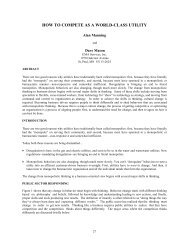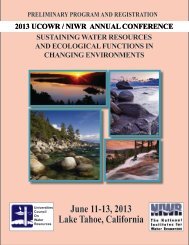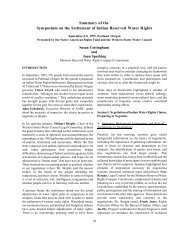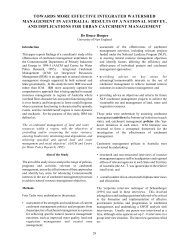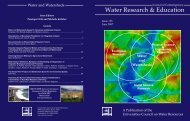Full Journal of Contemporary Water Research and Education, Issue ...
Full Journal of Contemporary Water Research and Education, Issue ...
Full Journal of Contemporary Water Research and Education, Issue ...
You also want an ePaper? Increase the reach of your titles
YUMPU automatically turns print PDFs into web optimized ePapers that Google loves.
IWRM in the Netherl<strong>and</strong>s25<strong>of</strong> putting the Third National <strong>Water</strong> Policy intopractice. As far as water quality <strong>and</strong> ecology areconcerned, the importance <strong>of</strong> the Third <strong>and</strong> Fourth<strong>Water</strong> Policy has been eclipsed by the European<strong>Water</strong> Framework Directive (2000/60/EC) from2000. This directive requires the EU MemberStates to prepare river basin management plans<strong>and</strong> reach a “good water status” <strong>of</strong> all its waters by2015 (Kallis <strong>and</strong> Butler 2001, Kaika 2003, Kaika<strong>and</strong> Page 2003). In case <strong>of</strong> non-compliance theywill eventually be fined by the European Court<strong>of</strong> Justice. A huge amount <strong>of</strong> attention in TheNetherl<strong>and</strong>s is now going to the implementation <strong>of</strong>the <strong>Water</strong> Framework Directive.DiscussionWhat do the Dutch experiences tell us aboutIWRM? First <strong>of</strong> all, they tell us that IWRM iscontext specific. In The Netherl<strong>and</strong>s, the IWRMconcept emerged in a specific water managementcontext, was interpreted <strong>and</strong> used in this context <strong>and</strong>in turn exerted some influence on this context. Thesame will be true in other countries. Consequently,IWRM cannot be evaluated independently from itscontext.Secondly, the Dutch experiences show thatIWRM functions ideologically. IWRM emphasizesthe need to consider all aspects <strong>and</strong> all functions<strong>of</strong> water. At the same time, the concept hides thefact that in practice priorities are set <strong>and</strong> politicalchoices are made. In The Netherl<strong>and</strong>s, IWRM wasdefined in neutral terms (“system,” “co-ordination,”<strong>and</strong> so forth), but in practice it promoted, at leastinitially, ecology <strong>and</strong> nature protection <strong>and</strong> wasused to defend the interests <strong>of</strong> the water sector.The ideological functioning <strong>of</strong> IWRM is notprimarily due to intentional, strategic behavior(although strategic behavior does occur). Rather,the case is that if IWRM is to function at all, it has toappeal to influential individuals <strong>and</strong> organizations.It has to fit in or link up with the world view <strong>and</strong>the values <strong>of</strong> individuals <strong>and</strong> organizations who caninfluence public opinion, research agendas, policyagendas <strong>and</strong> implementation. Thus, social <strong>and</strong>political relations influence whether <strong>and</strong> how theIWRM concept is used <strong>and</strong> how it is interpreted.At this point it may be worthwhile to emphasizethat this article has not analyzed IWRM as a specifictype <strong>of</strong> water management. The problem withthis is that there is no agreement on what type <strong>of</strong>water management IWRM exactly is. Instead, thisarticle has analyzed the functioning <strong>of</strong> the IWRMconcept in a specific country. It has described how“IWRM” was introduced, used, interpreted <strong>and</strong> reinterpretedin The Netherl<strong>and</strong>s. This has resultedin a richer picture <strong>of</strong> water management <strong>and</strong> therole that concepts, social relations, <strong>and</strong> power playin it (cf. the notion <strong>of</strong> symbolic power: Bourdieu1991).The current analysis is quite critical, but onecan draw a positive lesson from it. If it is true thatIWRM is inevitably ideological, the work <strong>of</strong> IWRMpr<strong>of</strong>essionals cannot be neutral. They always servesomeone or something. Their role is not limitedto delivering technically <strong>and</strong> scientifically soundinformation. In addition, they have to listen <strong>and</strong>give a voice to all stakeholders, including theunderprivileged. Or they can make another choice,but a choice has to be made.Author Bio <strong>and</strong> Contact InformationERIK MOSTERT has been director <strong>of</strong> the RBACentre <strong>of</strong> the Delft University <strong>of</strong> Technology since1995, where he teaches integrated water resourcesmanagement <strong>and</strong> water law. His research interestsinclude social learning, international cooperation<strong>and</strong> water management institutions. He has beeninvolved in several research projects for the EuropeanCommission, the Dutch government, UNEP,UNESCO <strong>and</strong> several other institutions. Moreover,he has been a member <strong>of</strong> the European Commission’s<strong>and</strong> Member States’ drafting group on PublicParticipation <strong>and</strong> the <strong>Water</strong> Framework Directive.ReferencesAst, J. A. v. 1999. Trends towards interactive watermanagement: Developments in international riverbasin management. Physics <strong>and</strong> Chemistry <strong>of</strong> theEarth (B) 24:597-602.Betlem, I. 1998. Relationships between water policy <strong>and</strong>environmental policy. In F. N. Correia, (ed.) <strong>Water</strong>Resources Management in Europe: Institutions, <strong>Issue</strong>s<strong>and</strong> Dilemmas. 143-179. Balkema, Rotterdam.Bijlsma, A. 1988. Integraal waterbeheer; een nieuweaanpak; symposium 1986, st<strong>and</strong> van zaken 1988.Nederl<strong>and</strong>s Instituut van Biologen, Utrecht.Biswas, A. K. 2004a. Integrated water resourcesmanagement: A reassessment. <strong>Water</strong> International29:398-405.JOURNAL OF CONTEMPORARY WATER RESEARCH & EDUCATIONUCOWR



